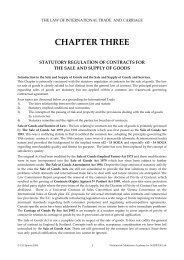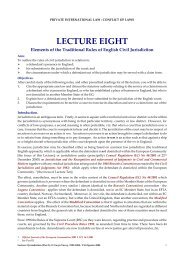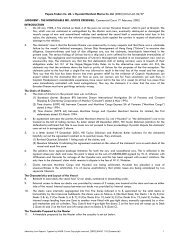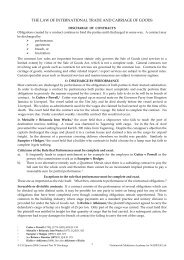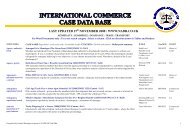Hadley Design Associates Ltd. v The Lord Mayor ... - Nadr.co.uk
Hadley Design Associates Ltd. v The Lord Mayor ... - Nadr.co.uk
Hadley Design Associates Ltd. v The Lord Mayor ... - Nadr.co.uk
Create successful ePaper yourself
Turn your PDF publications into a flip-book with our unique Google optimized e-Paper software.
<strong>Hadley</strong> <strong>Design</strong> <strong>Associates</strong> <strong>Ltd</strong>. v <strong>The</strong> <strong>Lord</strong> <strong>Mayor</strong> & Citizens of the City of Westminster [2003] ABC.L.R. 07/09<br />
<strong>co</strong>ver this case, I do not myself regard that as the end of the matter. As I ventured to observe in Interfoto Picture<br />
Library <strong>Ltd</strong>. v. Stiletto Visual Programmes <strong>Ltd</strong>. [1989] QB 433, 439, the law of England, while so far eschewing<br />
any broad principle of good faith in the field of <strong>co</strong>ntract, has responded to demonstrated problems of unfairness by<br />
developing a number of piecemeal solutions directed to the particular problem before it. It seems to me at least<br />
arguable that the <strong>co</strong>mmon law <strong>co</strong>uld, if the letter of the statute does not apply, treat the clear intention of the<br />
legislature expressed in the statute as a platform for invalidating or restricting the operation of an oppressive clause<br />
in a situation of the present, very special, kind. I say no more than that there is, I think, a question here which has<br />
attracted much attention in Commonwealth jurisdictions and on the <strong>co</strong>ntinent and may well deserve to be further<br />
explored here."<br />
76. In Timeload <strong>Ltd</strong>. v. British Tele<strong>co</strong>mmunications Plc there was no question but that the claimant had entered into an<br />
agreement with BT on the written standard terms of business of BT. That was accepted. <strong>The</strong> issue which Sir Thomas<br />
Bingham had to address in the specific <strong>co</strong>ntext of Unfair Contract Terms Act 1977 s.3(2)(b)(i) was whether a<br />
provision for termination of a <strong>co</strong>ntract was a provision by reference to which the party seeking to terminate the<br />
<strong>co</strong>ntract was claiming to be entitled "to render a <strong>co</strong>ntractual performance substantially different from that which was<br />
reasonably expected of him". <strong>The</strong> provisional view, at any rate, of Sir Thomas seems to have been that the<br />
exercise of a right of termination did not fall within the subsection. He <strong>co</strong>mmented on the submission of <strong>co</strong>unsel to<br />
that effect that, "That may indeed be so". His <strong>co</strong>nsideration of the possibility that English law might develop in the<br />
direction of treating "the clear intention of the legislature expressed in the statute as a platform for invalidating or<br />
restricting the operation of an oppressive clause in a situation of the present, very special, kind" was unnecessary<br />
unless his provisional view was that Unfair Contract Terms Act 1977 s.3(2)(b)(i) did not apply in relation to the<br />
exercise of an express right to terminate a <strong>co</strong>ntract.<br />
77. In the present case there were live issues both as to whether the Council had "written standard terms of business"<br />
which were relevant, and as to whether, if so, it had dealt with HDA on those terms. Evidence was put before me<br />
in the form of reports made by officers to <strong>co</strong>mmittees of the Council that in 1984 the Council had it in mind to<br />
prepare what were described as "standard <strong>co</strong>nditions for building surveyors" and in due <strong>co</strong>urse did so. <strong>The</strong> first<br />
report in which there was a relevant reference was one prepared by the Director of Housing for a meeting of the<br />
Contracts Sub-Committee on 13 March 1984 in which, in paragraph 1.02, there was mentioned a "desire first to<br />
<strong>co</strong>mplete draft standard Conditions for Building Surveyors". <strong>The</strong> se<strong>co</strong>nd reference was at paragraph 5.1.2.2 of a<br />
joint report of the City Treasurer, the Chief Executive, the City Architect, the Director of Housing and the City<br />
Engineer prepared for a meeting of the Policy and Resources (Contracts) Sub-Committee on 5 April 1984:-<br />
"Officers have very recently finalised Standard Conditions for Building Surveyors for issue with a further tender<br />
invitation for surveying services on the following classification of works:a)<br />
House rehabilitation;<br />
b) Housing Estate modernisation in blocks of flats;<br />
c) Housing stock major renovation (including window replacement, <strong>co</strong>ncrete and brick repairs, roof renewal, services<br />
improvements etc.);<br />
d) Private housing Works in Default/Means of Escape;<br />
e) Housing stock external joinery repairs and cyclical rede<strong>co</strong>ration."<br />
It seemed from the evidence of Mr. Wickersham that standard <strong>co</strong>nditions for building surveyors were in fact<br />
produced and used, but when this happened was unclear. Although Mr. Wickersham was not asked about them in<br />
terms, it seems to me that the Conditions of Appointment in<strong>co</strong>rporated into the 1991 Contract may well be the<br />
"standard <strong>co</strong>nditions for building surveyors" which the Council adopted. If that is not so, no other document was put<br />
before me which seemed to meet the description "standard <strong>co</strong>nditions for building surveyors". If it is so, the fact<br />
that the Conditions of Appointment were expressly in<strong>co</strong>rporated into the 1991 Contract, but not into the 1987<br />
Contract, would seem to suggest that they had not been adopted at the date what became the 1987 Contract<br />
was drafted.<br />
78. Mr. Burr asserted that the modifications to the RICS 1981 Conditions included in clause 12 of the 1987 Contract<br />
were the "standard <strong>co</strong>nditions for building surveyors" of the Council. <strong>The</strong>re was no evidence to support that<br />
assertion. <strong>The</strong> furthest that the evidence went was that some, at any rate, of the modifications included in clause<br />
12 were modifications which the Council customarily sought in negotiating any <strong>co</strong>ntract which was to in<strong>co</strong>rporate<br />
the RICS 1981 Conditions and that those modifications were also to a significant extent those made in the<br />
"standard <strong>co</strong>nditions for building surveyors". Mr. Burr <strong>co</strong>ntended that that was sufficient for the 1987 Contract to<br />
be on the "written standard terms of business" of the Council. I reject that submission. <strong>The</strong> <strong>co</strong>ncept underlying the<br />
provisions of Unfair Contract Terms Act 1977 s.3, in my judgment, is that there should exist a stock of written, no<br />
doubt usually, at any rate, printed, <strong>co</strong>ntract <strong>co</strong>nditions which was simply drawn from as a matter of routine and<br />
intended to be adopted or imposed without <strong>co</strong>nsideration or negotiation specific to the individual case in which<br />
they were to be used. That seems to me to be the force of the words "written" and "standard" in the expression<br />
"written standard terms of business". In other words, it is not enough to bring a case within Unfair Contract Terms<br />
Act 1977 s.3 that a party has established terms of business which it prefers to adopt, as, for example, a form of<br />
draft <strong>co</strong>ntract maintained on a <strong>co</strong>mputer, or established requirements as to what <strong>co</strong>ntracts into which it entered<br />
should <strong>co</strong>ntain, as, for example, provision for arbitration in the event of disputes. Something more is needed, and<br />
on principle that something more, in my judgment, is that the relevant terms should exist in written form prior to the<br />
possibility of the making of the relevant agreement arising, thus being "written", and they should be intended to<br />
Arbitration, Building & Construction Law Reports. Typeset by NADR. Crown Copyright reserved. [2003] EWHC 1617 (TCC) 18



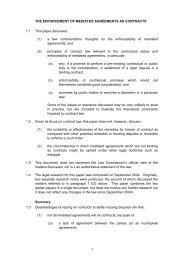

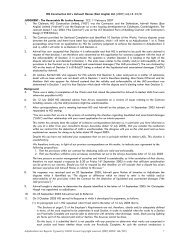
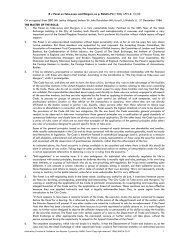
![Petrotrade Inc v Texaco Ltd [2000] Int.Com.L.R. 05/23 CA on ... - NADR](https://img.yumpu.com/12049751/1/190x245/petrotrade-inc-v-texaco-ltd-2000-intcomlr-05-23-ca-on-nadr.jpg?quality=85)
![Nicholas Drukker & Co v Pridie Brewster & Co [2005] ADR ... - NADR](https://img.yumpu.com/12033930/1/190x245/nicholas-drukker-co-v-pridie-brewster-co-2005-adr-nadr.jpg?quality=85)
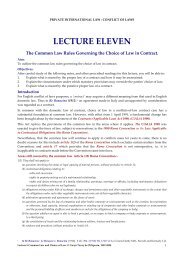
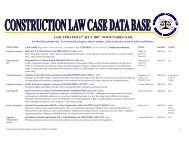
![Watkin Jones v Lidl UK GMBH (No1) [2001] Adj.L.R. 12/21 1 ... - NADR](https://img.yumpu.com/10629615/1/190x245/watkin-jones-v-lidl-uk-gmbh-no1-2001-adjlr-12-21-1-nadr.jpg?quality=85)
